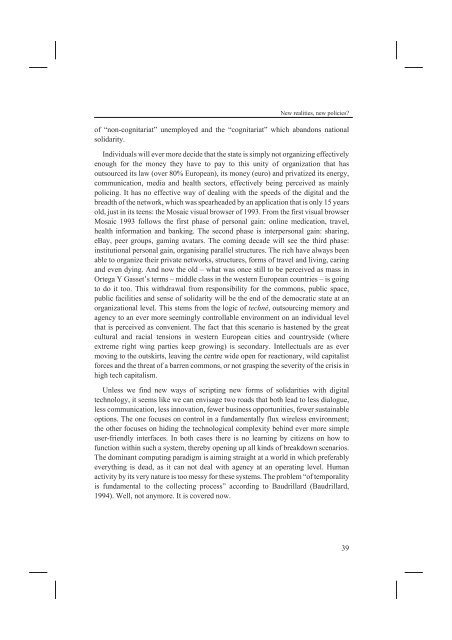D:\Documents and Settings\Ana\My Documents\Biserka-knjiga ...
D:\Documents and Settings\Ana\My Documents\Biserka-knjiga ...
D:\Documents and Settings\Ana\My Documents\Biserka-knjiga ...
You also want an ePaper? Increase the reach of your titles
YUMPU automatically turns print PDFs into web optimized ePapers that Google loves.
New realities, new policies?<br />
of “non-cognitariat” unemployed <strong>and</strong> the “cognitariat” which ab<strong>and</strong>ons national<br />
solidarity.<br />
Individuals will ever more decide that the state is simply not organizing effectively<br />
enough for the money they have to pay to this unity of organization that has<br />
outsourced its law (over 80% European), its money (euro) <strong>and</strong> privatized its energy,<br />
communication, media <strong>and</strong> health sectors, effectively being perceived as mainly<br />
policing. It has no effective way of dealing with the speeds of the digital <strong>and</strong> the<br />
breadth of the network, which was spearheaded by an application that is only 15 years<br />
old, just in its teens: the Mosaic visual browser of 1993. From the first visual browser<br />
Mosaic 1993 follows the first phase of personal gain: online medication, travel,<br />
health information <strong>and</strong> banking. The second phase is interpersonal gain: sharing,<br />
eBay, peer groups, gaming avatars. The coming decade will see the third phase:<br />
institutional personal gain, organising parallel structures. The rich have always been<br />
able to organize their private networks, structures, forms of travel <strong>and</strong> living, caring<br />
<strong>and</strong> even dying. And now the old – what was once still to be perceived as mass in<br />
Ortega Y Gasset’s terms – middle class in the western European countries – is going<br />
to do it too. This withdrawal from responsibility for the commons, public space,<br />
public facilities <strong>and</strong> sense of solidarity will be the end of the democratic state at an<br />
organizational level. This stems from the logic of techné, outsourcing memory <strong>and</strong><br />
agency to an ever more seemingly controllable environment on an individual level<br />
that is perceived as convenient. The fact that this scenario is hastened by the great<br />
cultural <strong>and</strong> racial tensions in western European cities <strong>and</strong> countryside (where<br />
extreme right wing parties keep growing) is secondary. Intellectuals are as ever<br />
moving to the outskirts, leaving the centre wide open for reactionary, wild capitalist<br />
forces <strong>and</strong> the threat of a barren commons, or not grasping the severity of the crisis in<br />
high tech capitalism.<br />
Unless we find new ways of scripting new forms of solidarities with digital<br />
technology, it seems like we can envisage two roads that both lead to less dialogue,<br />
less communication, less innovation, fewer business opportunities, fewer sustainable<br />
options. The one focuses on control in a fundamentally flux wireless environment;<br />
the other focuses on hiding the technological complexity behind ever more simple<br />
user-friendly interfaces. In both cases there is no learning by citizens on how to<br />
function within such a system, thereby opening up all kinds of breakdown scenarios.<br />
The dominant computing paradigm is aiming straight at a world in which preferably<br />
everything is dead, as it can not deal with agency at an operating level. Human<br />
activity by its very nature is too messy for these systems. The problem “of temporality<br />
is fundamental to the collecting process” according to Baudrillard (Baudrillard,<br />
1994). Well, not anymore. It is covered now.<br />
39



